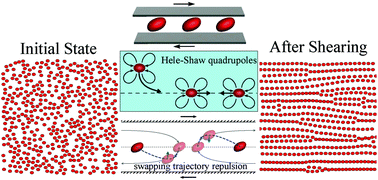Mechanisms of spontaneous chain formation and subsequent microstructural evolution in shear-driven strongly confined drop monolayers†
Abstract
It was experimentally demonstrated by Migler and his collaborators [Phys. Rev. Lett., 2001, 86, 1023; Langmuir, 2003, 19, 8667] that a strongly confined drop monolayer sheared between two parallel plates can spontaneously develop a flow-oriented drop-chain morphology. Here we show that the formation of the chain-like microstructure is driven by far-field Hele-Shaw quadrupolar interactions between drops, and that drop spacing within chains is controlled by the effective drop repulsion associated with the existence of confinement-induced reversing streamlines, i.e., the swapping trajectory effect. Using direct numerical simulations and an accurate quasi-2D model that incorporates quadrupolar and swapping-trajectory contributions, we analyze microstructural evolution in a monodisperse drop monolayer. Consistent with experimental observations, we find that drop spacing within individual chains is usually uniform. Further analysis shows that at low area fractions all chains have the same spacing, but at higher area fractions there is a large spacing variation from chain to chain. These findings are explained in terms of uncompressed and compressed chains. At low area fractions most chains are uncompressed (spacing equals lst, which is the stable separation of an isolated pair). At higher area fractions compressed chains (with tighter spacing) are formed in a process of chain zipping along y-shaped structural defects. We also discuss the relevance of our findings to other shear-driven systems, such as suspensions of spheres in non-Newtonian fluids.



 Please wait while we load your content...
Please wait while we load your content...